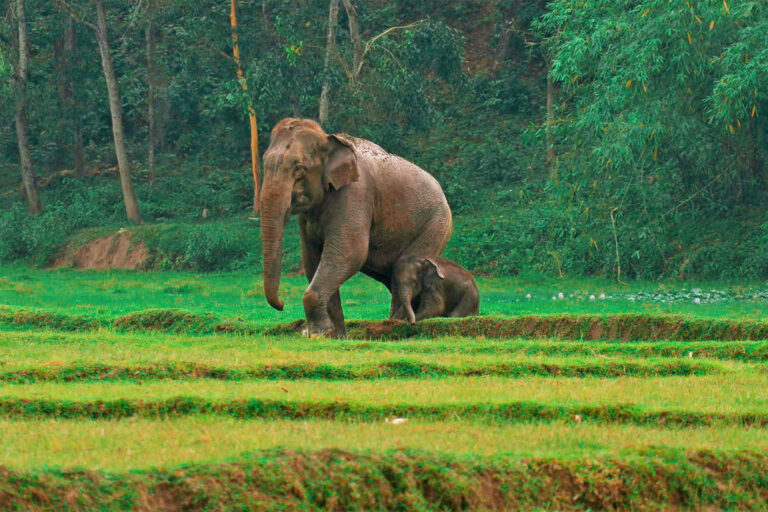In response to rising human-elephant conflicts, Bangladesh is planning to declare the elephant habitats in its northeastern parts a protected area for the species. The country is one of the few where Indian elephants (Elephas maximus indicus) are found, with an estimated wild population of 268 resident elephants, all in the southern districts. The IUCN declared the species critically endangered within Bangladesh, where they primarily inhabit the southern hilly forests, and also the northeastern parts. The elephants of the northeastern habitat are considered “non-residents,” which weren’t counted in the census: They migrated from neighboring India’s Meghalaya state a few years ago as they’ve done for generations, but they haven’t been able to return since 2019 due to the closed elephant passage at the international border installed and maintained by India. Consequently, the trapped elephants roam the region in search of food through the seasons. Conflicts between humans and elephants thus rose over the years. Following a story about the crisis published by Mongabay on March 12 this year, the Ministry of Environment, Forests, and Climate Change (MoEFCC) sent a team of forest officials and experts to visit the region and subsequently made the decision to declare the zone “protected.” Syeda Rizwana Hasan, advisor to the ministry told Mongabay, “I personally visited the area on May 26, to understand the gravity of the situation. Initially, we are working on declaring the area as protected and finding ways to reduce conflicts and damages. At the same time, we will continue to talk…This article was originally published on Mongabay
Search
Recent Research
Want your Blog Article featured on our website?
Research
Featured News
Explaining Katsina’s Massive Leap to 2nd Position in the 2025 Climate Governance Ranking
In 2024, during the first edition of the Subnational Climate Governance Performance Rating and Ranking,
COP30: Firm to connect institutions with international climate finance opportunities
SISTME, a climate change and biodiversity conservation consulting firm based in Argentina, has offered to
From resistance to planetary governance, Indigenous women redefine global climate action
While world leaders negotiate behind closed doors in the Blue Zone of COP30, Indigenous Women
Sahara Group Foundation launches 16th Sahara Go Recycling Hub to boost environmental sustainability, economic empowerment
Sahara Group Foundation, the corporate social impact arm of Sahara Group, has commissioned its 16th
Climate finance is the lifeblood of climate action – Simon Stiell at COP30
Remarks delivered by UN Climate Change Executive Secretary, Simon Stiell, at the third High-Level Ministerial
UNDP, REA, GEF commission Plateau solar mini-grid to power agricultural value chains, empower rural communities
The United Nations Development Programme (UNDP), in partnership with the Rural Electrification Agency (REA) and
COP30: Africa urges world leaders to turn pledges into action
Africa has called on the world leaders to turn their pledges into action regarding the
Thousands join global marches calling on govts at COP30 to deliver climate justice
An estimated 30,000 people marched through the Brazilian city of Belém on Saturday, November 15,


